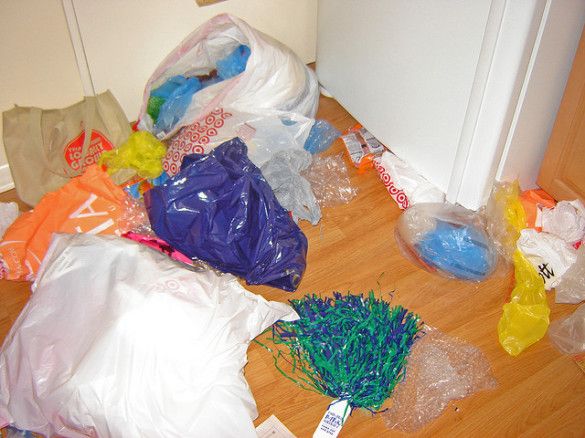Downsides To Plastic Bag Bans? Studies Suggest Risk Alongside Benefits

There might be reason for the City Council to pause on their plans to limit the use of plastic bags, and it concerns health and safety. As we wrote in our article on the City Council’s effort to charge a 10-cent fee to anyone given a disposable plastic bag at checkout, other cities like Washington D.C. and San Francisco have already had plastic bag fees from which to learn a thing or two. The Huffington Post linked to series of articles that say that claims that reusable bags are hot spots for the growth of bacteria and disease.
Citing a report by Bloomberg, the Huff Post highlighted a disturbing consequence of people attempting to do the environmentally responsible thing by using reusable bags:
[T]he [plastic bag] industry has highlighted news reports linking reusable shopping bags to the spread of disease. Like this one, from the Los Angeles Times last May: “A reusable grocery bag left in a hotel bathroom caused an outbreak of norovirus-induced diarrhea and nausea that struck nine of 13 members of a girls’ soccer team in October, Oregon researchers reported Wednesday.” The norovirus may not have political clout, but evidently it, too, is rooting against plastic bags.
Warning of disease may seem like an over-the-top scare tactic, but research suggests there’s more than anecdote behind this industry talking point. In a 2011 study, four researchers examined reusable bags in California and Arizona and found that 51 percent of them contained coliform bacteria. The problem appears to be the habits of the reusers. Seventy-five percent said they keep meat and vegetables in the same bag. When bags were stored in hot car trunks for two hours, the bacteria grew tenfold.
The solution to this problem is obvious: wash your reusable bag. But, according to the study, 97 percent of reusable bag users never wash their bags.
Still, in places where people were charged for plastic bags, the numbers also showed a dramatic result that helped remove tons of slow-to-degrade plastic from landfills. A New York Times report on the issue cited the effect of a plastic bag tax in Ireland:
Solid academic research is surprisingly hard to find. One widely cited study from 2007, however, found that imposition of a bag tax of €0.15, or $0.20, in 2002 had a drastic effect in Ireland. The study, published in the journal Environmental and Resource Economics, cited a reduction of about 94 percent in the use of plastic bags.
When polled, Dubliners weren’t even overly annoyed at the plastic bag ban and transitioned to a plastic-free world easily. Surprisingly, the same went for Texas, a place notorious for values that run opposite to environmentalist concerns:
In Texas, a state that takes pride in its large pickup trucks and oil drilling, three communities have established bag bans in some form in the past year.
One is South Padre Island, a beach community with heavy tourist traffic, which began enforcing a bag-reduction policy in January.
Near South Padre, another bag-ban policy is in place in the border city of Brownsville, one of the poorest large cities in Texas.
A third community that has enacted a bag ban, Fort Stockton, is in an oil and ranching area in remote West Texas. Plastic bags, blown by the wind, had been getting stuck on barbed wire, cactuses and mesquite trees, according to Darren Hodges, a City Council member who pushed for the ban.
Since the ban took effect last autumn, Mr. Hodges said, residents have been gradually growing accustomed to taking reusable bags into shops. And the litter problems seem to be improving, he said, with fewer plastic bags on the fences and cactuses.
Despite the general acceptance of people exposed to the new laws, significant problems resulting from the ban have actually led to the deaths of people in San Francisco.
A study of San Francisco’s bag ban put out last year by two law professors — Jonathan Klick from the University of Pennsylvania and Joshua D. Wright from George Mason University — made the grim finding that people are actually dying because of the bag ban. “The San Francisco ban led to between 5.4 and 15.8 additional deaths,” the professors wrote, concluding that “the current trend toward bag bans may be imprudent” on economic grounds.
Fox News put the results more succinctly: “San Francisco’s Plastic Bag Ban Kills About 5 People a Year.”
Yikes. When I originally heard the news about the proposed plastic bag fees, I thought it was an all-around good idea. My cupboard is filled with plastic bags that I feel too guilty about throwing away and I always feel a twinge of guilt when I stand in ‘zombie mode’ at a checkout line and a clerk quickly hands me a plastic bag for a candy bar. The 10-cent fee on my laziness will probably motivate me to tote around a reusable bag because I’ll be damned if I pay an extra 10 cents for a 99-cent Twix bar.
Let’s just hope nobody, especially me, accidentally kills themselves in trying to protect the environment.




